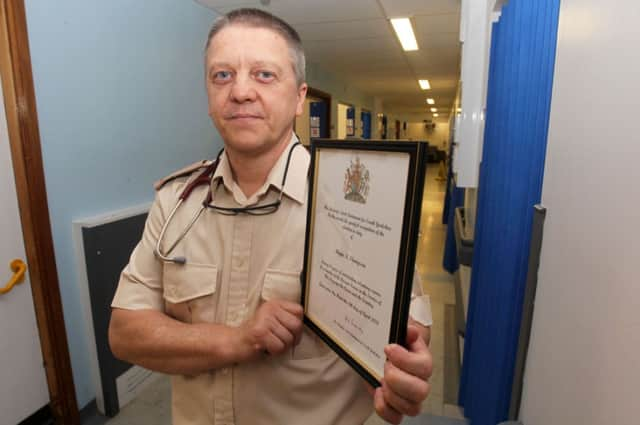From ward to war zone for King’s Mill nurse


But Kenny Thompson is used to facing conditions that are even more difficult to work in and treating injuries that are much more serious than those the average King’s Mill Hospital patient comes in with.
Kenny, an advanced nurse practitioner, is also an Army Reservist in the Army’s 212 Field Hospital regiment and has worked in both Iraq and Afghanistan, treating injured soldiers from Britain and other countries.
Advertisement
Advertisement
The differences between working in an NHS hospital and a field hospital in a war zone are stark.
“The difference is you are out in an austere environment, particularly in Iraq and Afghanistan.
“I was working seven days a week, 12 to 14 hours a day on the last tour. It eventually takes its toll after a couple of months,” he said.
“You live on your adrenaline because you never know what the next call is going to be - blast injuries, burns, gun shot wounds.”
Advertisement
Advertisement
Kenny (52) retrained as a nurse about 20 years ago after working as a coal miner in Yorkshire. He has been at King’s Mill for just over a year.
He became a reservist after he and a friend were supposed to go together to find out about the 212 regiment, but when she did not turn up for the appointment, he signed up alone.
Kenny has worked his way up through both the army ranks and NHS ranks.
Starting as a lieutenant, he was captain then a major and has served in the Iraq War as a shift leader for A&E in the field hospital and has been to Afghanistan twice.
Advertisement
Advertisement
The first time he was second in command of A&E at Camp Bastion’s hospital and the second time he was head of the department.
“Because I have worked my way up through the A&E system, I know what’s needed as a nurse and can direct people,” he said. “You have to be slick at what you do and always ready for the next soldiers to come in.”
Kenny says that he has learnt important and transferable skills through his experiences but coming back to work in England can be difficult after being in a war zone.
“It can be hard because it’s not something you want to chat about. It can be quite isolating even if you have colleagues around you,” he added.